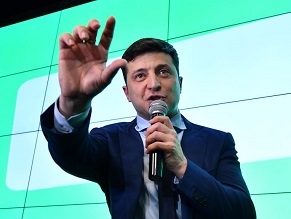|
Euroasian Jewish News

Ukrainian presidential candidate Volodymyr Zelensky during a campaign event (Photo: Getty Images)
|
Ukraine’s next president could be Jewish — and it is not an issue
05.04.2019, Ukraine It sounds like the set-up for a joke.
On Sunday, Volodymyr Zelensky, a Jewish comedian best known for playing the head of state in the satirical television programme Servant of the Nation, won the first round of Ukraine’s Presidential elections, defeating incumbent Petro Poroshenko by more than 16 points.
A political neophyte accused by his critics of serving as a political pawn of Jewish oligarch Ihor Kolomoisky, an expatriate and Poroshenko rival on whose channel the show airs, Mr Zelensky has expressed few firm policy positions beyond attacking the current political elite, which has been rocked by a series of corruption scandals.
He is slated to go head-to-head with Mr Poroshenko in the second round of balloting at the end of the month.
If elected, Mr Zelensky will be the first Jewish president of Ukraine, a fact that has left many in the former Soviet Republic deeply unimpressed.
“Zelensky’s Jewish identity was not part of his campaigning,” noted Izabella Tabarovsky, a Ukraine expert at the Kennan Institute.
The fact that the issue has not come up shows that, despite Russian propaganda to the contrary, antisemitism is “not a central or guiding ideology for the vast majority of the population,” added Matthew Kupfer, a journalist at the Kyiv Post.
“It is a positive sign that exclusionary ethno-nationalism has not taken hold of the country politically.”
Antisemitic violence is low compared to the west, like in much of the former communist bloc, and the country has had a Jewish Prime Minister in Volodymyr Groysman since 2016.
The overall consensus has been that his religious identity has not had much of an impact.
Oleksandr Feldman, a Jewish MP and minor oligarch from Kharkiv, said that that he did not see why Mr Zelensky would be any different.
Boris Lozhkin, a former senior Poroshenko aide and the current head of the Jewish Confederation of Ukraine, a community umbrella group, said he expects to work closely with the victor, no matter who it is: “It is important for us that the president continues the policy of combating antisemitism and supporting national minorities — and we can surely expect that from both candidates.
“Anyone able to increase public trust in our political system is good for Ukraine and good for the Jewish population of Ukraine, one of Europe’s most important Jewish communities.”
Yaakov Dov Bleich, the American-born Chief Rabbi, commented that while he enjoyed Mr Zelensky’s show, “real life is different from movies.”
And while it was “a good sign” that his Judaism did not become an issue in the election, “the fact that he is Jewish is in my opinion [something that] can work against him and the Jewish population.” Mr Poroshenko’s popularity plummeted in the five years he has been president.
“The presidency, since it’s such a difficult job and Ukraine is in a difficult situation, can bring a person to become very unpopular. Add to that the fact that he is Jewish and I think that that is not a very good recipe for the Jewish community or for him personally for that matter.”
Mr Zelensky is unlikely to take action to push back on Ukraine’s state memory policy, Rabbi Bleich continued, noting that the television comedian “has no experience in governing, in politics, in economy, in anything.”
By Sam Sokol
The Jewish Chronical
|
|
